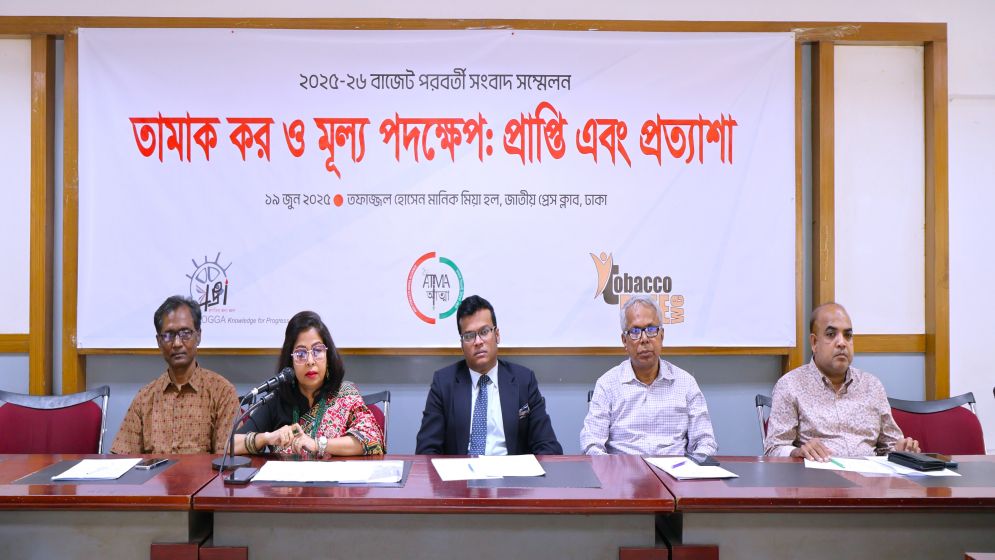Proposed FY 2025-26 budget risks increasing tobacco use, reducing revenue, say anti-tobacco advocates

Public health experts and anti-tobacco advocates have voiced serious concerns over the proposed national budget for the fiscal year 2025–26, warning that the decision to leave tobacco product prices and tax rates unchanged could have dire public health and economic consequences.
Speaking at a post-budget press conference organized by the research organization PROGGA (Knowledge for Progress) and the Anti-Tobacco Media Alliance (ATMA), they cautioned that the government's inaction would likely lead to increased tobacco consumption, a surge in tobacco-related deaths, and the loss of significant potential revenue.
The experts criticized the government for missing a critical opportunity to reform tobacco taxation. In particular, they pointed out the failure to merge the low and medium tiers of cigarettes—a measure that, if adopted, could have deterred smokers from switching to cheaper alternatives and instead encouraged cessation.
By maintaining the current multi-tiered pricing structure, they argued, the proposed budget undermines the impact of existing tobacco control policies. According to their estimates, the government stands to earn an additional BDT 20,000 crore in revenue from the cigarette sector if the tax reform proposals put forth by anti-tobacco groups are implemented.
Drawing on provisional data from the Bangladesh Bureau of Statistics (BBS), the speakers noted that per capita income has risen by approximately 11.5% over the past year.
Despite this, the prices of tobacco products remain unchanged, making them more affordable in real terms—particularly for young people, who are more vulnerable to initiating tobacco use.
The budget also retains the price and supplementary duty on bidis for the sixth and tenth consecutive years, respectively. This continued stagnation in taxation, the speakers warned, will make bidis even more lucrative for producers while increasing their accessibility to low-income groups.
Meanwhile, smokeless tobacco products like jarda and gul—largely consumed by poor and female populations—have also seen no change in price or tax, raising fears of greater affordability and heightened health risks for already vulnerable communities.
Their concerns were amplified when compared against the rising cost of essential commodities, as reported by the Trading Corporation of Bangladesh (TCB). In just one year, prices of key items such as loose soybean oil, miniket rice, white writing paper, rui fish, and eggs have increased by significant margins—ranging from around 3.6% to nearly 13.6%.
Against this backdrop of inflation, the unchanged cost of tobacco products effectively makes them cheaper in comparison, further encouraging consumption.
During the event, Syed Yusuf Saadat, a Research Fellow at the Centre for Policy Dialogue (CPD), emphasized the urgent need to rationalize the cigarette tax structure. He explained that the minimal difference in prices between the low and medium tiers allows consumers to switch between them without any meaningful deterrent, rendering the current tax and pricing strategies largely ineffective.
He proposed reducing the number of cigarette tiers from four to three by merging the low and medium tiers, setting a unified retail price of BDT 90 for 10 sticks. High-tier cigarettes would remain at BDT 140, while premium-tier cigarettes would be priced at BDT 190 for the same quantity. A 67% supplementary duty would be applied uniformly across all tiers.
For bidis, the proposals recommended setting the retail price of non-filtered varieties at BDT 25 for 25 sticks and filtered ones at BDT 20 for 20 sticks, both subject to a 45% supplementary duty.
Regarding smokeless tobacco, the suggested retail price for jarda was BDT 55 per 10 grams and BDT 30 for the same amount of gul, each followed by a 60% supplementary duty.
The proposals also called for maintaining the existing 15% VAT and the 1% health development surcharge on retail prices of all tobacco products.
Speakers at the press conference emphasized that adopting these recommendations would not only boost government revenue by an estimated BDT 20,000 crore but also significantly contribute to the country’s public health goals.
They argued that proper tax policy could help prevent up to 1.7 million premature deaths, including nearly 900,000 among youth, by discouraging tobacco use and making harmful products less affordable.
The event featured prominent figures from the anti-tobacco movement, including Mortuza Haider Liton, Convener of ATMA; Mizan Chowdhury, Co-convener of ATMA; ABM Zubair, Executive Director of PROGGA; and Hasan Shahriar, Head of Programs at PROGGA, who presented the proposed reforms. The session was moderated by Nadira Kiron, Co-convener of ATMA.
—-

